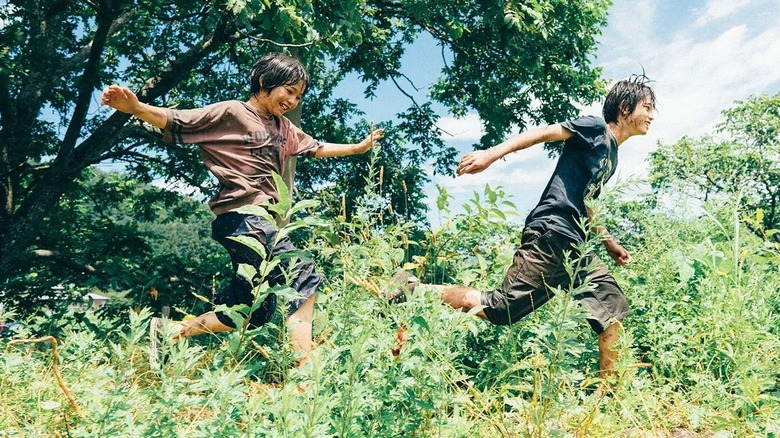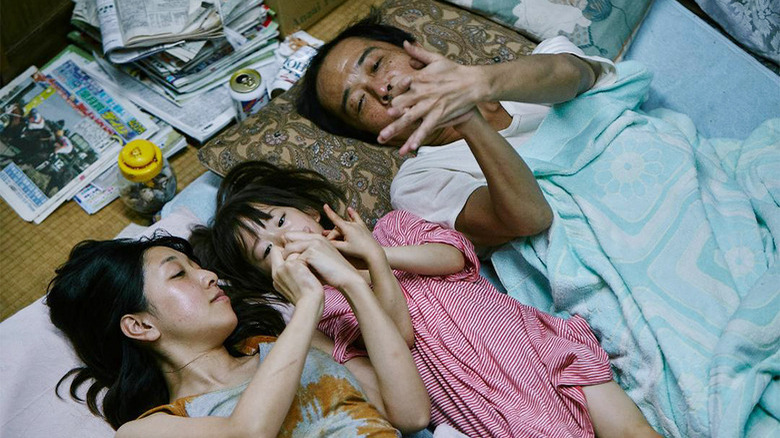Here's When You Can Watch Hirokazu Kore-Eda's Monster At Home
We may receive a commission on purchases made from links.
"Monster" ("怪物", or "Kaibutsu"), directed by Hirokazu Kore-eda, is one of the most acclaimed movies of 2023 that you probably haven't heard of yet.
Set in Japan, the film follows three people: the single mother Saori Mugino (Sakura Andō), her young son Minato (Sōya Kurokawa), and Minato's teacher Michitoshi Hori (Eita Nagayama). Saori begins to suspect that Hori is abusing her son, while Hori suspects that there's something sinister in the boy's head. The truth, which I'll leave unspoiled, is a lot sadder. The film is told from their three perspectives (first Saori's, then Hori's, and finally Minato's). Seeing the same sequence of events three times highlights how hard it is to truly understand someone by looking at them from the outside.
"Monster" enjoyed a film festival run, taking home the Queer Palm (bestowed to Kore-eda) and Best Screenplay (to Yuji Sakamoto) awards at the 76th Cannes Film Festival in May 2023. The film premiered in Japan in June 2023 but enjoyed only a limited theatrical run in the United States at the end of the year (I barely managed to squeeze it in by venturing to an AMC theater 40 minutes out of the way).
If your interest is piqued and you missed "Monster" in theaters, fear not. According to WhenToStream.com, "Monster" will be available as Premium Video On-Demand (PVOD) come February 27, 2024. Presumably, the film will be available for both digital rental and purchase (prices are not confirmed yet). It will be available on the usual suspects of PVOD: Apple, Amazon, Google, etc.
According to Amazon listings, "Monster" will also be getting a physical Blu-ray release. The "Monster" Blu-ray is currently scheduled for release on April 9, 2024. It is available for pre-order on Amazon, priced at $29.99.
What to watch before Monster?
"Monster" is a standalone story, but it would be a mistake to not watch any more Hirokazu Kore-eda films. He's been making movies since 1995 and has over a dozen on his resume. Some of his more recent films include "Shoplifters," about a found family of vagrants in modern Japan, and "Broker," a South Korean film (featuring Song Kang-ho of "Parasite") about black market adoption. In both of these, like "Monster," Kore-eda focuses on people with sad but ordinary lives, weaving in moments of well-earned and bittersweet emotion you'll never forget.
As for his influences, the structure of "Monster" is indebted to Akira Kurosawa's "Rashomon" — a 1950 Jidaigeki (Japanese period drama) about the trial of an accused murderer. Three witnesses, including the accused, give vastly different testimonies about the event that contradict each other. Similar framing devices have been employed in "Hero" (starring Jet Li) and Ridley Scott's "The Last Duel." The difference is that, in "Monster," the three sections don't contradict each other — they simply show the three leads' perspectives with the limited information they each have, while only the audience puts the whole puzzle together. The triptych structure and queer themes of "Monster" owe just as much to Barry Jenkins' "Moonlight" as well.
"Monster" shares its title with another acclaimed piece of Japanese media: Naoki Urasawa's manga/anime, about a neurosurgeon hunting a former patient turned serial killer. This one is admittedly a bit of a reach, but both "Monster" stories are slowly unraveled mysteries about how a harsh world can shape children for the worse. Both Kore-eda and Urasawa end their stories with a similar message — that calling other people "monsters" serves only to justify evil done to them.

